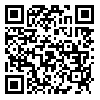Volume 28, Issue 1 (5-2015)
jdm 2015, 28(1): 76-85 |
Back to browse issues page
Abstract: (6256 Views)
Background and Aims: Despite significant decline in dental caries in recent decades, the disease remains a
public health problem especially in developing countries. In recent years combined application of laser and
fluoride has been introduced as a new caries-preventive measure. The purpose of the present study was to review
the literature on the preventive effect of combined application of laser and fluoride on the dental caries.
Materials and Methods: PubMed, Google Scholar and EMBASE databases were searched for articles published
from 1990 to November 30, 2013. Various combinations of the following keywords were used: Dental caries,
Laser, Fluoride, Fluoride therapy, Prevention and Enamel. The inclusion criteria included all levels of available
evidence. Articles published only in english language were evaluated, and unpublished data were not sought.
Results: Several studies evaluating the effect of laser alone or combined with topical fluoride to prevent dental
enamel demineralization were found. Studies assessing the combined effect were more frequently done on
permanent teeth and just a few studies were done on primary teeth. In total, most of the studies confirmed that
combined application of laser and topical fluoride has a remarkable effect in prevention of enamel
demineralization compared to application of each of them alone.
Conclusion: Laser irradiation combined with topical fluoride application seems to provide the best prevention
effect on the dental caries initiation and progression in enamel of permanent teeth. However, more experimental
and clinical studies are necessary to be done on the primary teeth in this area.
Type of Study: Research |
Subject:
general
Received: 2015/04/29 | Accepted: 2015/04/29 | Published: 2015/04/29
Received: 2015/04/29 | Accepted: 2015/04/29 | Published: 2015/04/29
| Rights and Permissions | |
 |
This work is licensed under a Creative Commons Attribution-NonCommercial 4.0 International License. |


